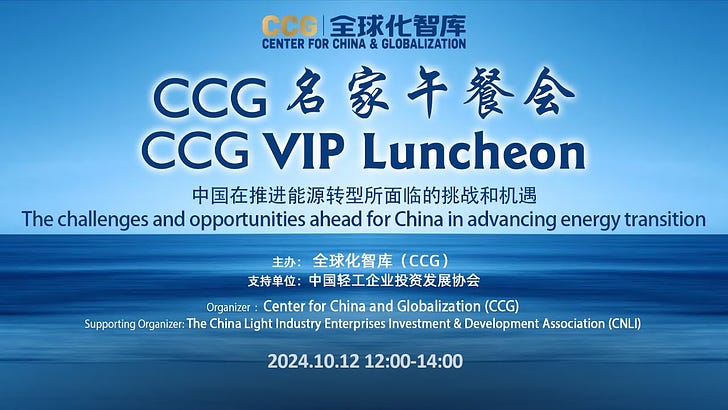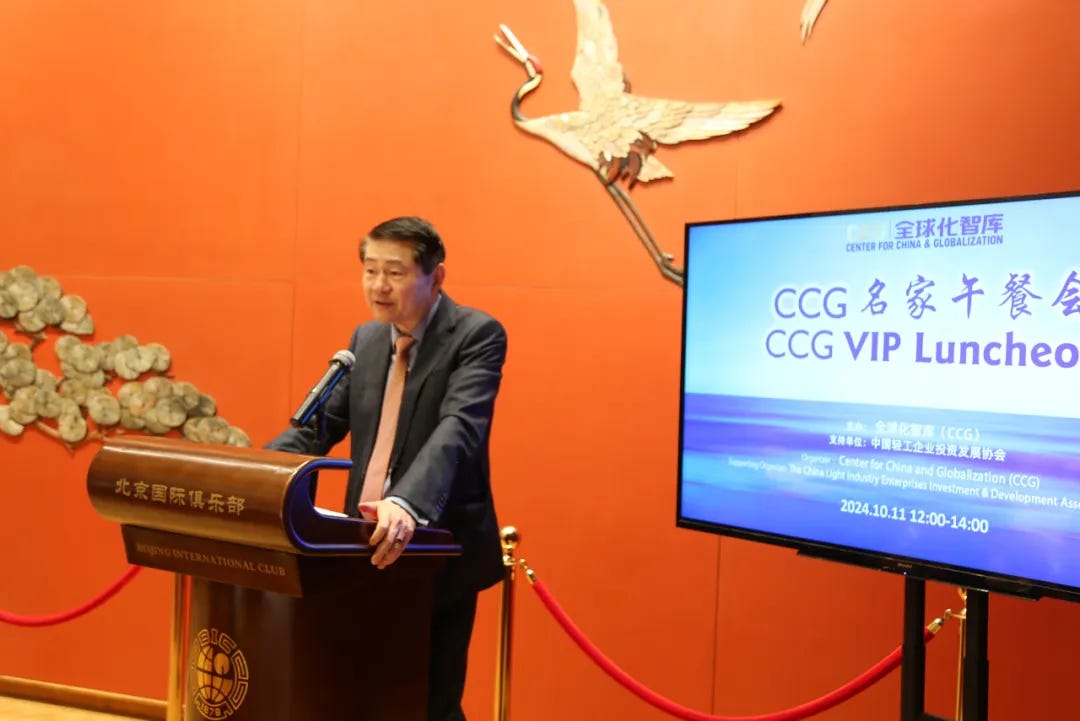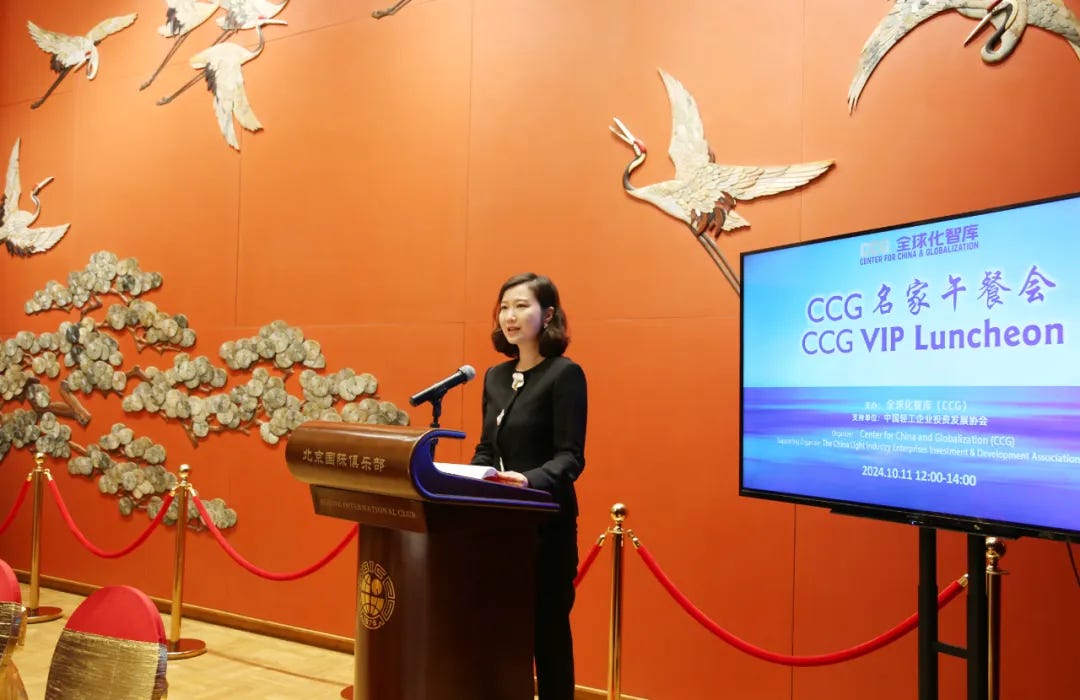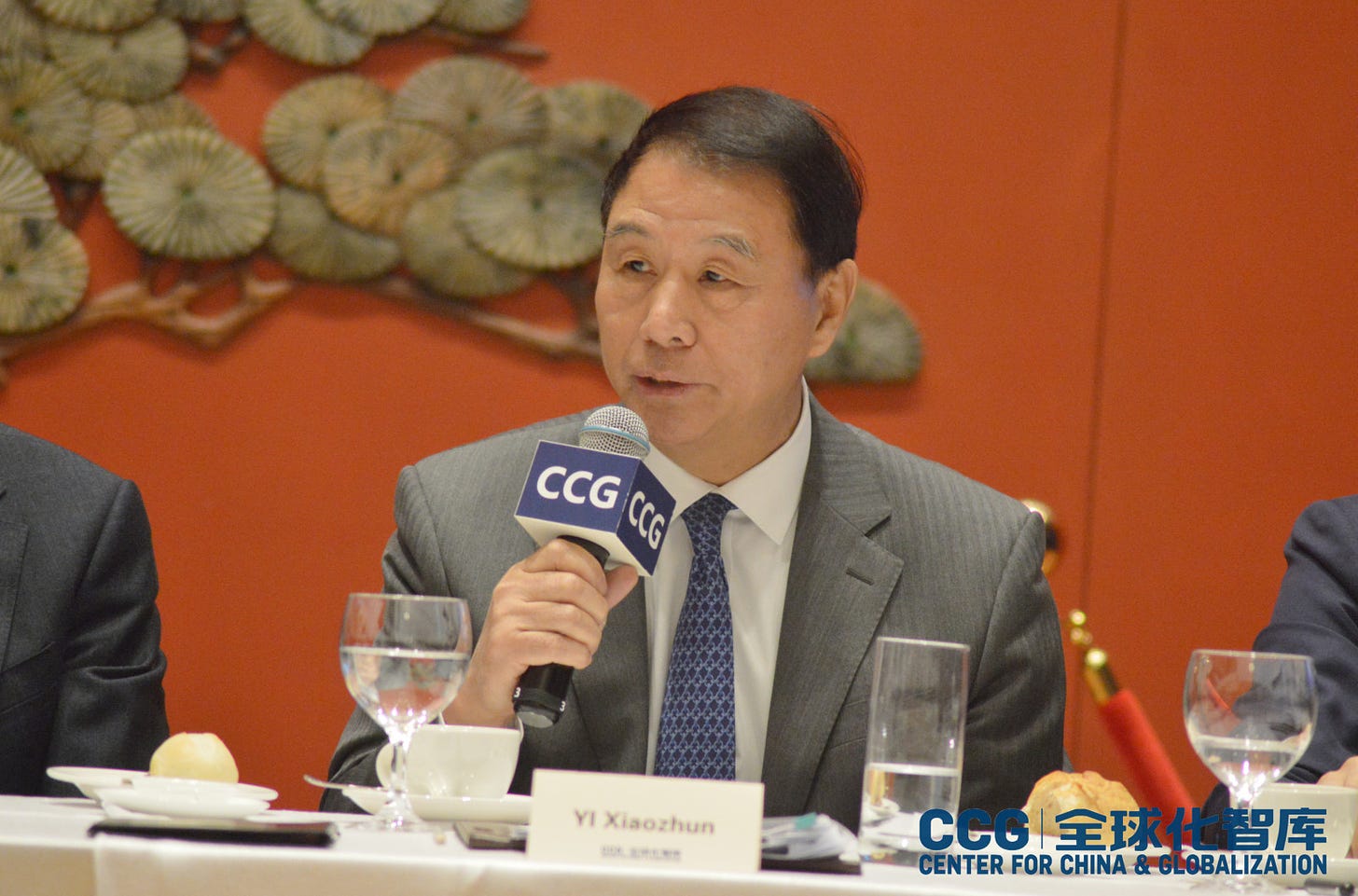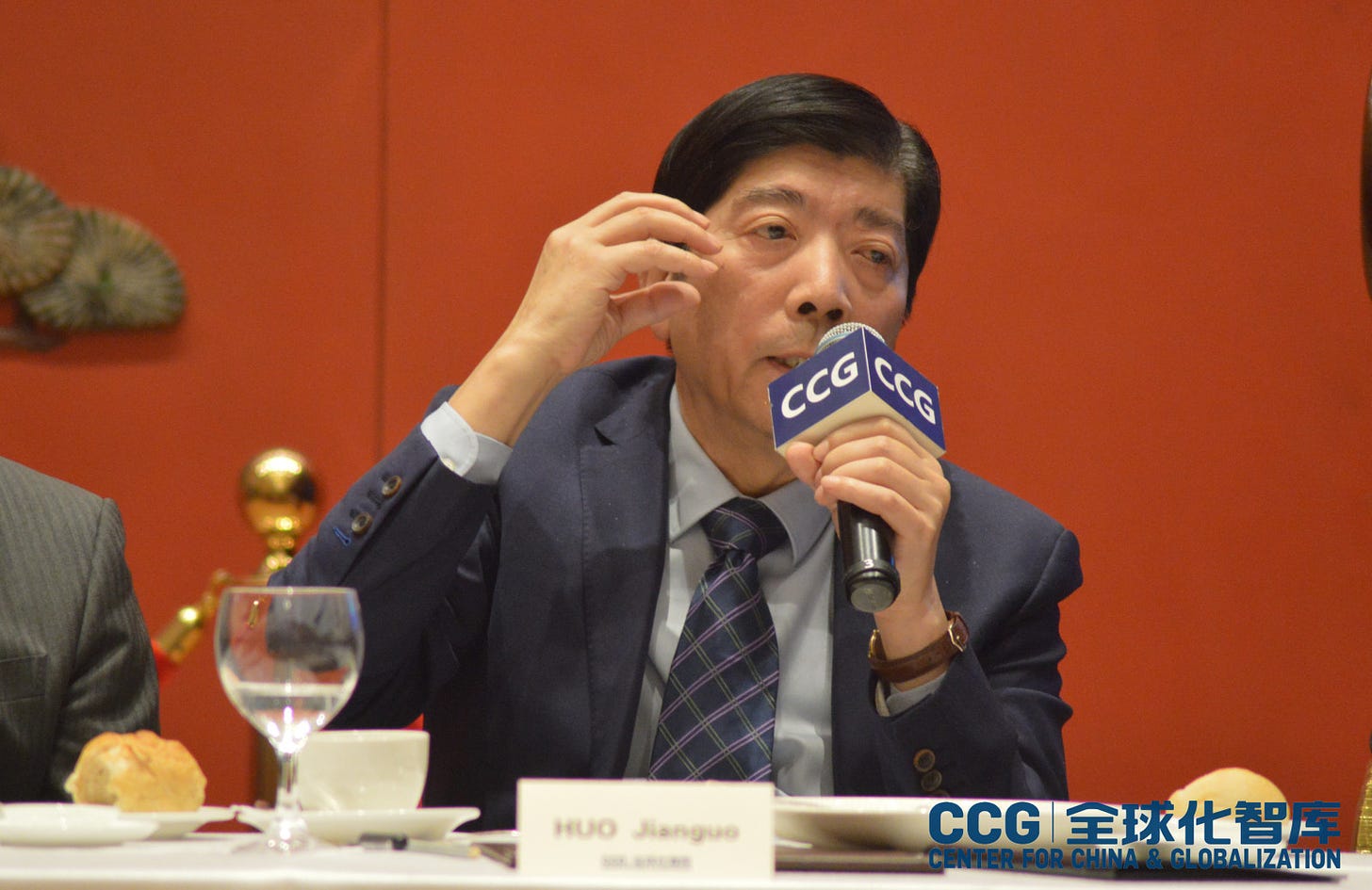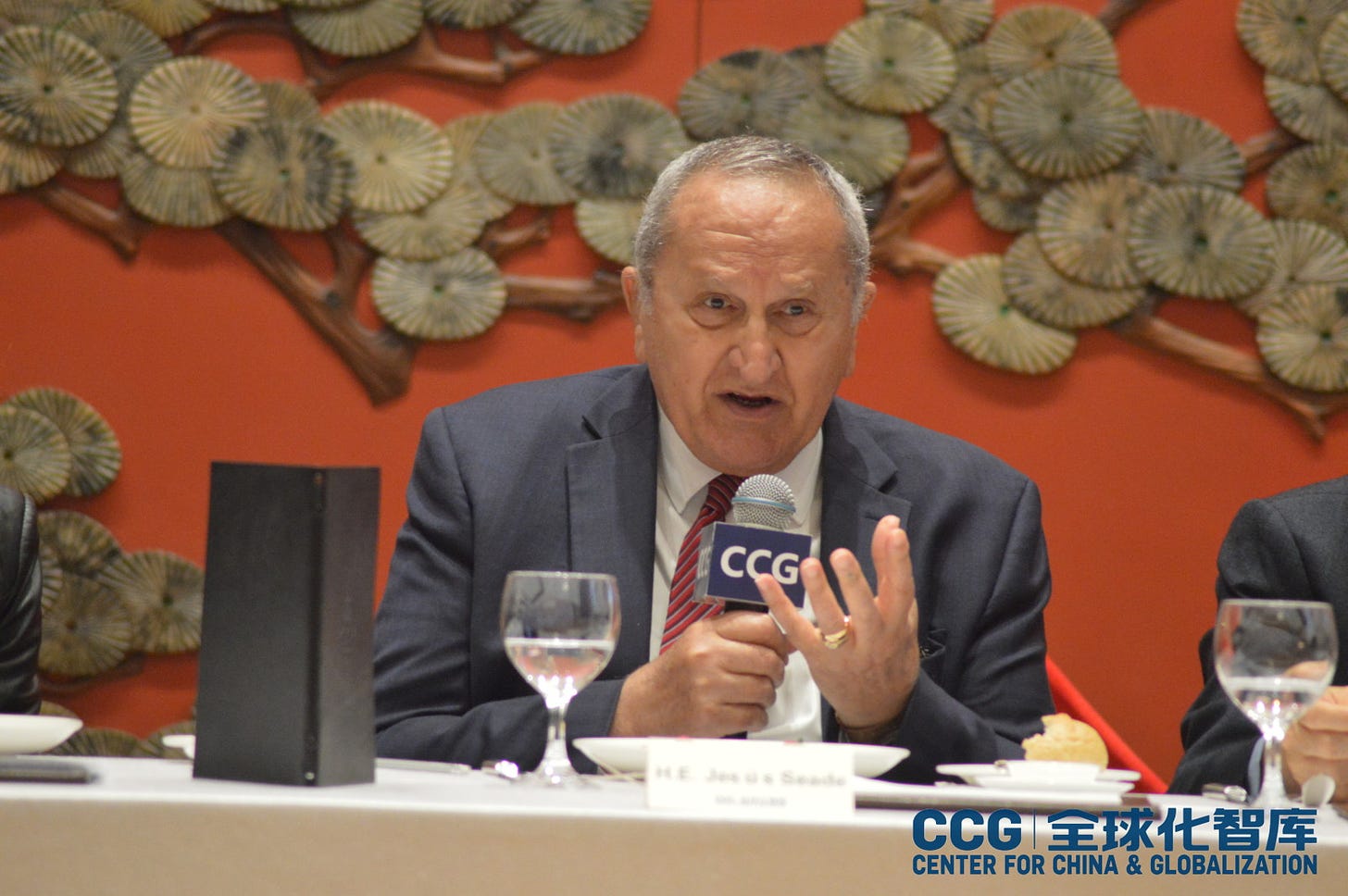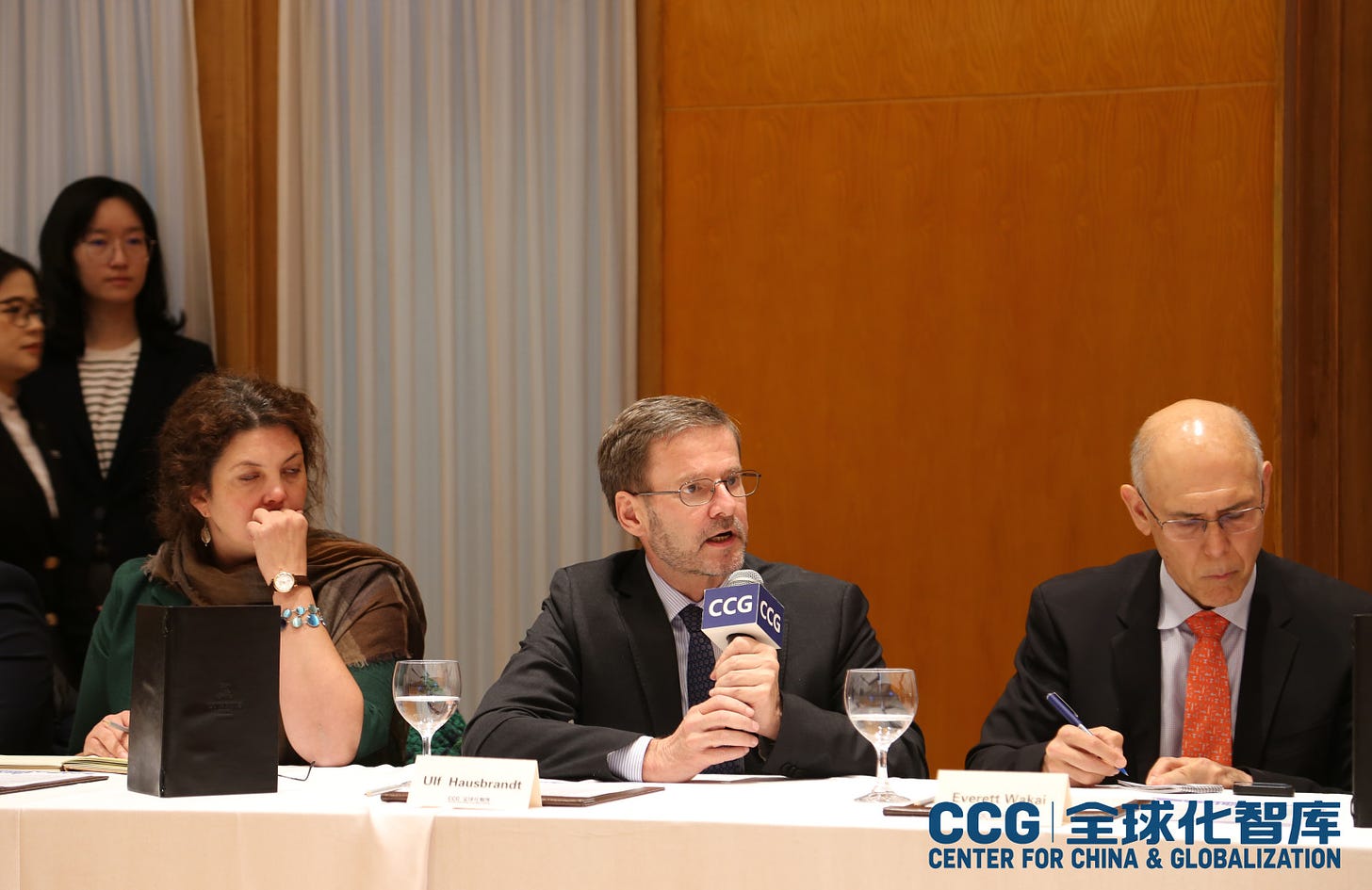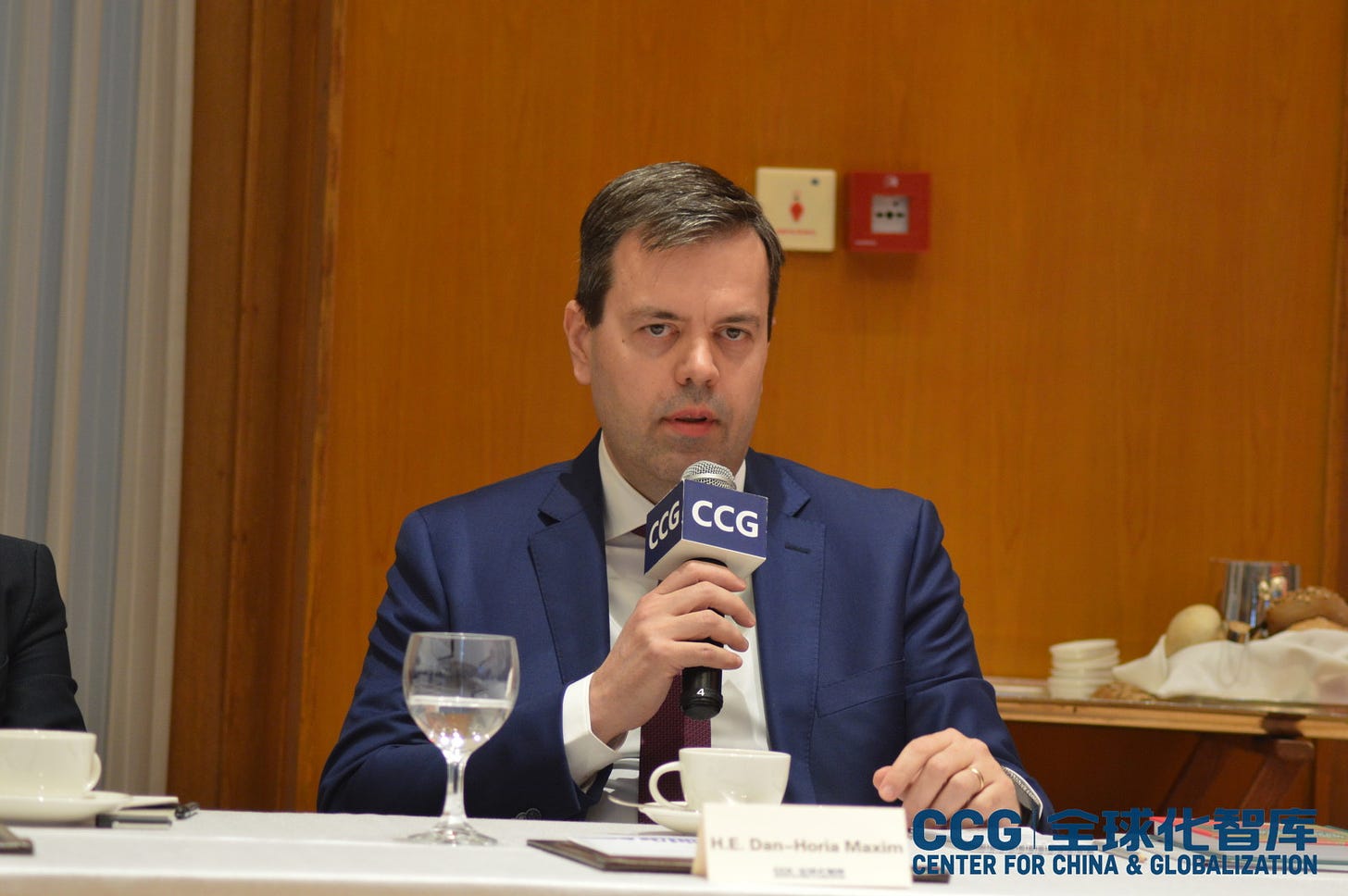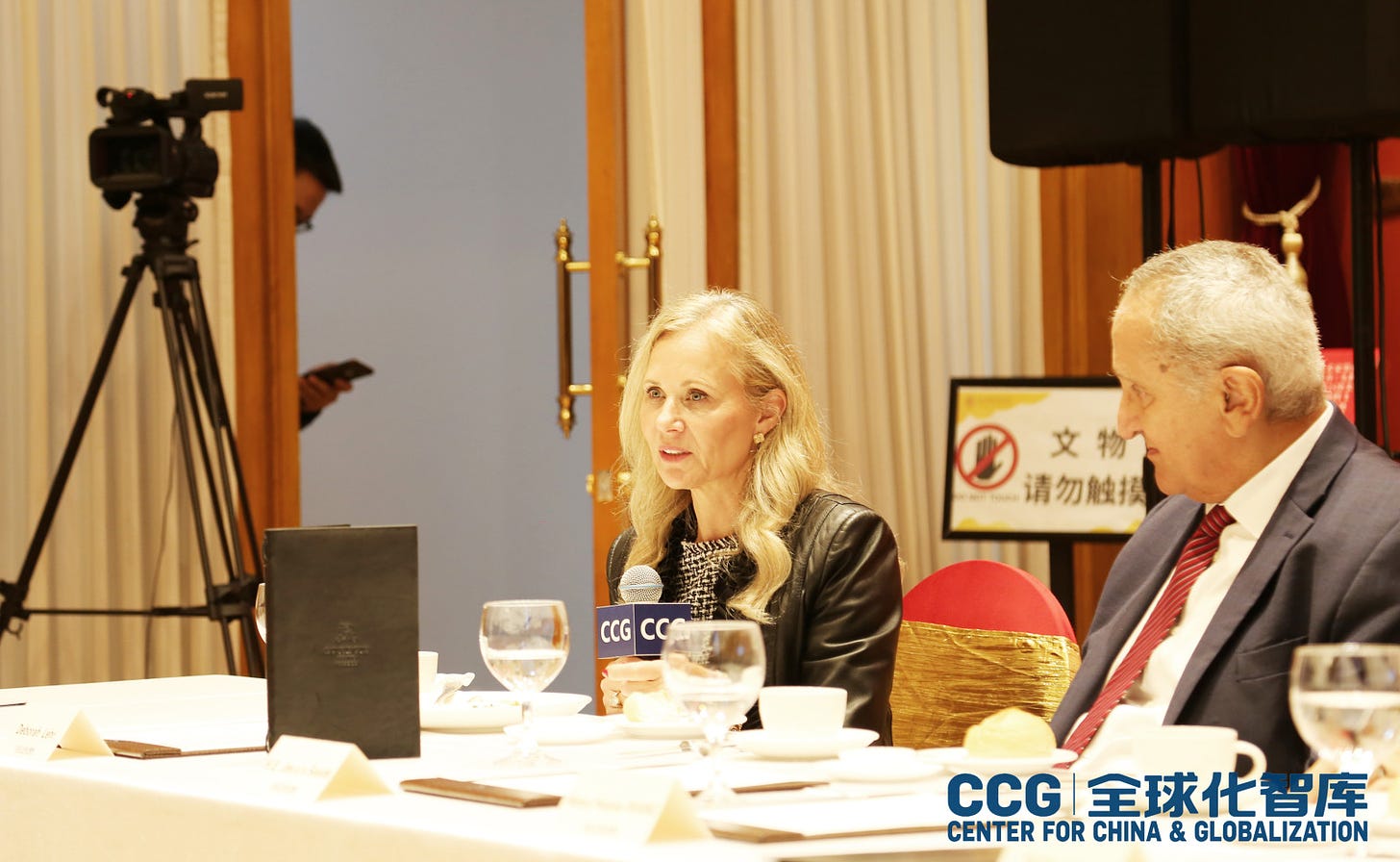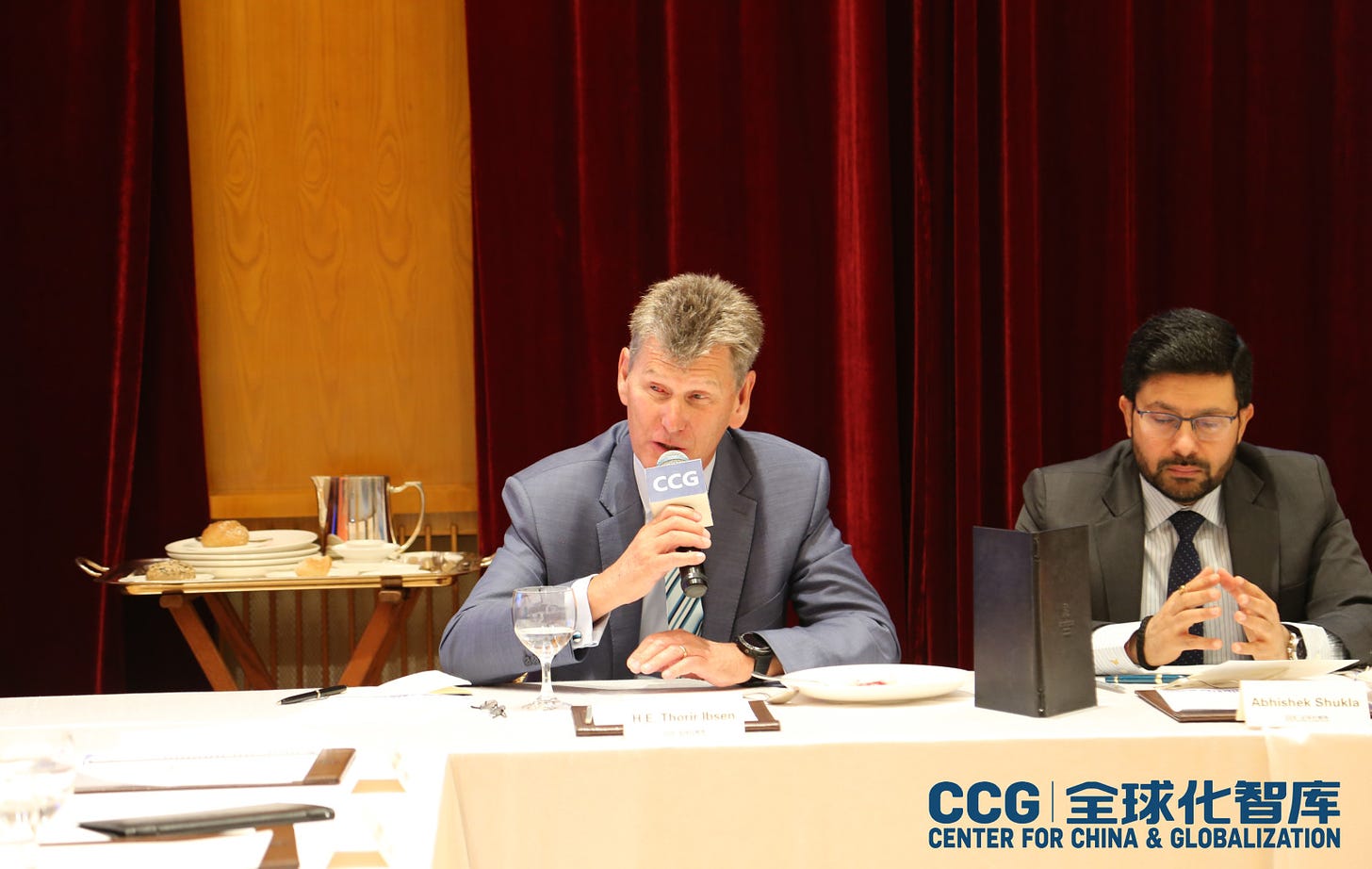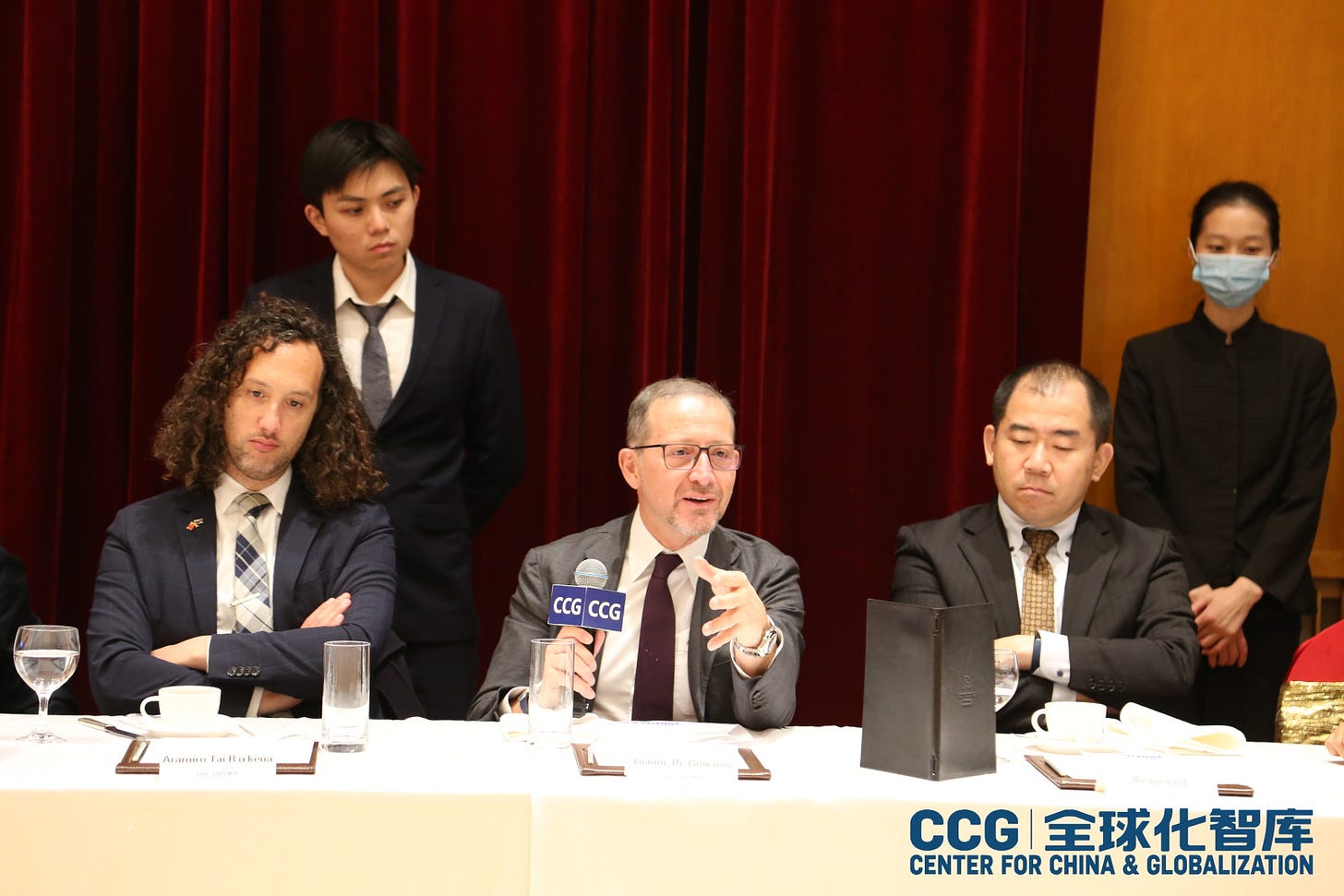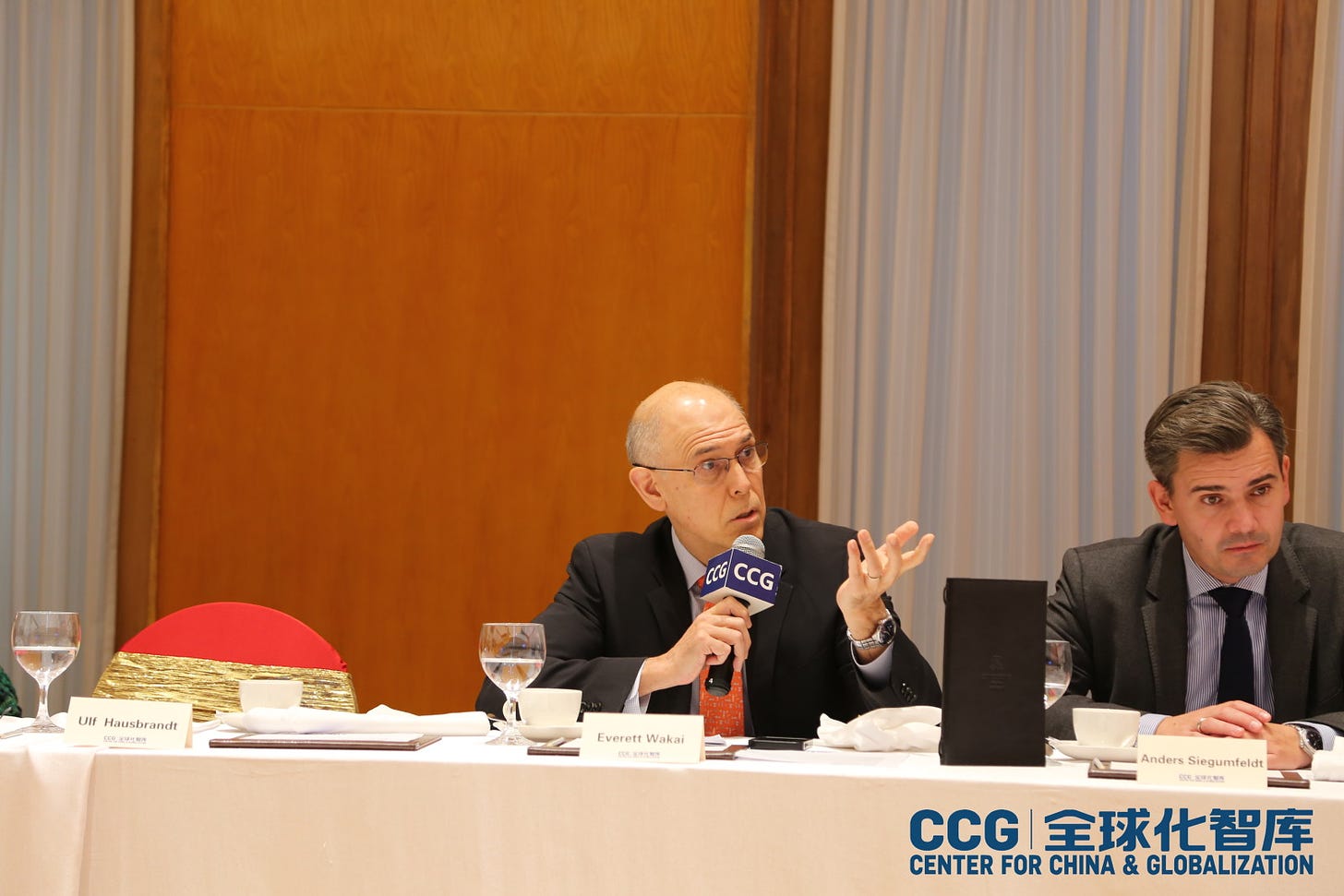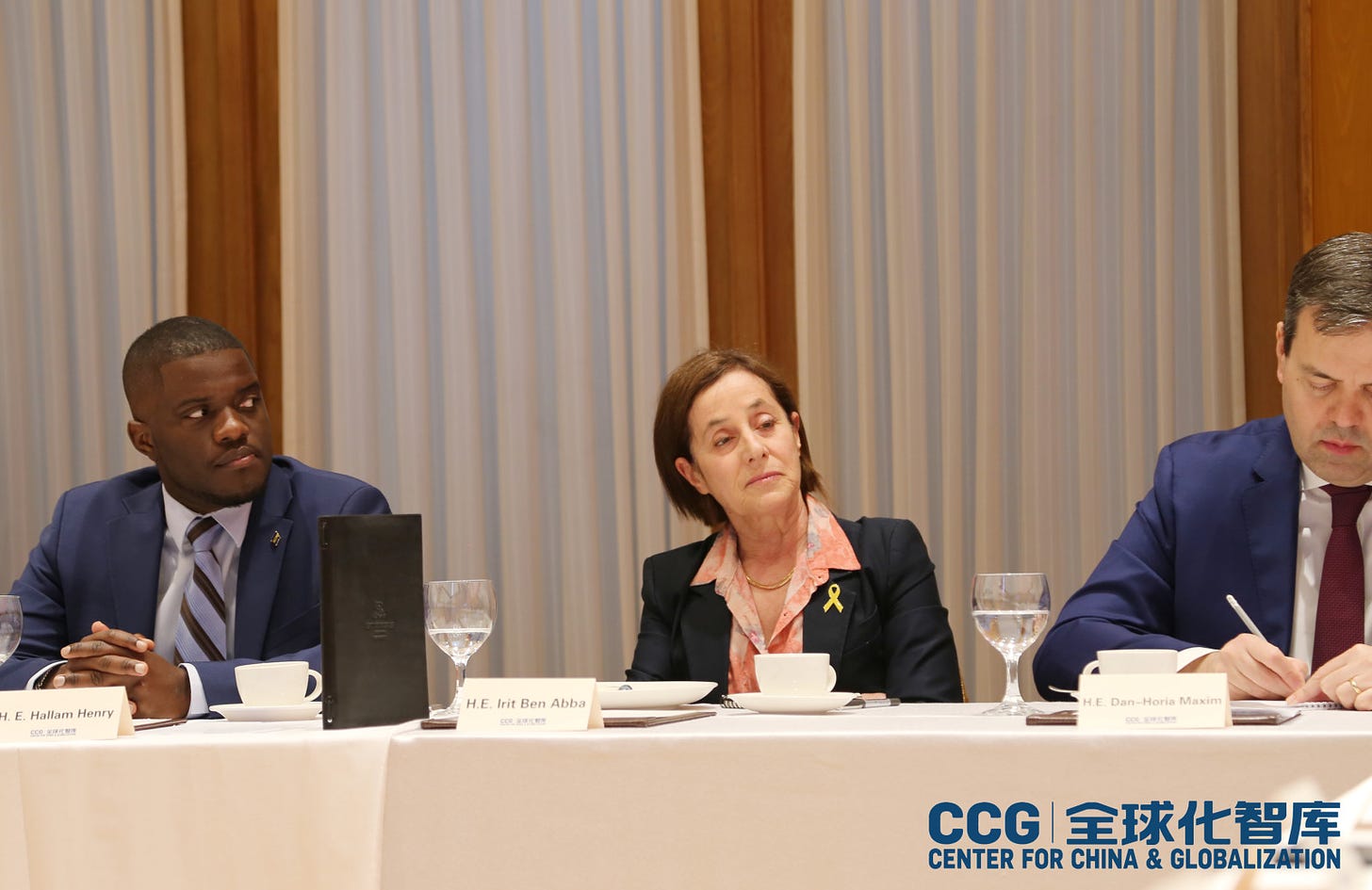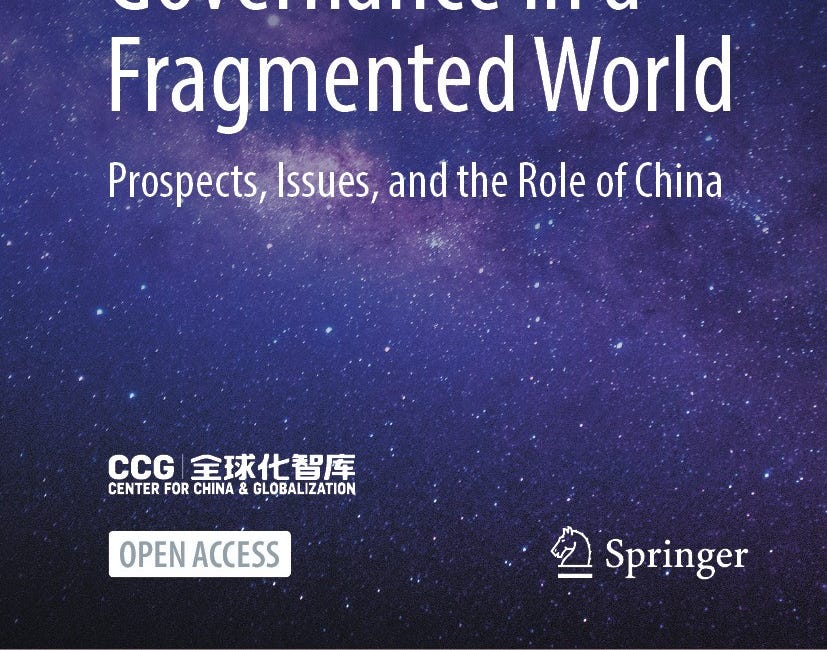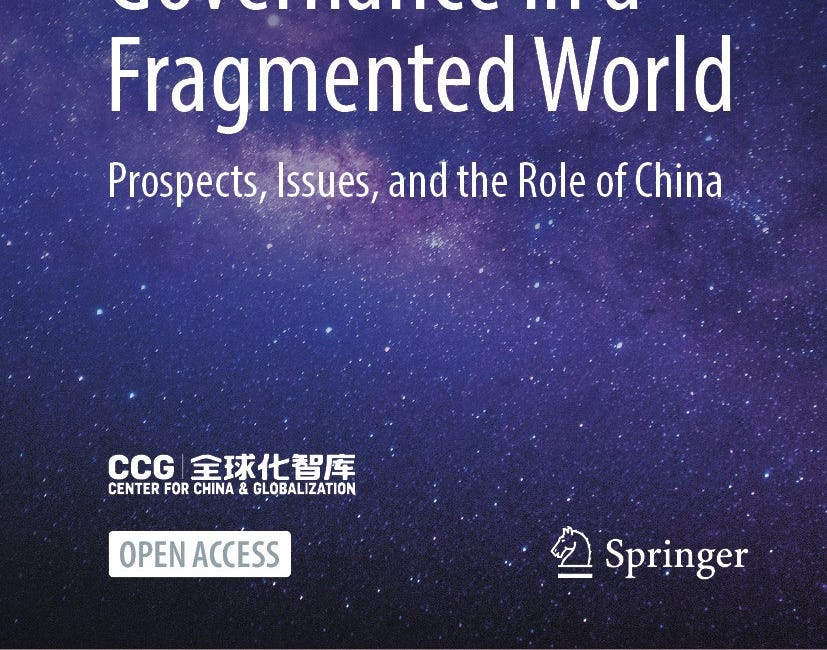Full transcript of Yi Xiaozhun & Huo Jianguo
Former Vice Minister of Commerce & Vice President of the China WTO Research Association discuss China's energy transition (disputes) under the multilateral trade framework.
The fifth CCG VIP Luncheon held last Friday, October 11, in the historic Xianhe Hall of the Beijing International Club, featured YI Xiaozhun, Former Deputy Director-General of WTO and Former Vice Minister of Commerce of China, and HUO Jianguo, Vice President of the China World Trade Organization Research Association and Former President of the Chinese Academy of International Trade and Economic Cooperation (CAITEC).
CCG has broadcast the video recording of the full event on Chinese online platforms, where it remains accessible. The video recording has also been uploaded to YouTube.
The event was moderated by Henry Huiyao Wang, President of CCG and Mabel Lu Miao, Secretary-General of CCG.
Nearly 40 ambassadors, diplomats based in Beijing, representatives from international organizations, multinational corporations, as well as Chinese and international journalists attended the VIP luncheon.
This transcript is based on the video recording and has not been reviewed by the speakers.
YI Xiaozhun, Former Deputy Director-General, WTO; Former Vice Minister of Commerce of China
Thank you very much, Henry, for your very nice introduction. I saw one of my friends Deborah is coming. It's a great pleasure for me to be with you for this lunch discussion. Let me start by thanking CCG for their kind invitation. I'm so pleased to join you for this discussion as I myself also used to belong to the ambassadors' group.
In recent years, with the growing international competitiveness of China's new energy industry, especially in the rapid rise of EVs in the global market, the U.S. and Europe began to question whether China's competitiveness comes from high government subsidies. They even move further by taking unilateral tariffs or anti-subsidy investigations, trying to prevent the expansion of China's EV industry. Let me share with you some of my thoughts on this matter.
First, China's success in the new energy sector is largely due to its early start and consistent efforts that have never wavered. China began addressing pollution as far back as the late 1970s and early 1980s. All local people of my age still remember that at that time, rapid industrialization and urbanization were causing serious environmental problems.
By the 1990s, all major cities in China were suffering severe air pollution, forcing the government to take bold actions toward a green transition. In 2005, China set strict targets for energy conservation and emission reduction, pushing companies to speed up the energy transition. As a result, businesses began adopting greener production methods. In 2011, cities like Beijing and Shanghai imposed quota and lottery systems for passenger car license plates to tackle traffic congestion and air pollution.
However, to encourage the adoption of electric vehicles, the exception was made to allow consumers to skip the lottery if they choose to purchase an EV so that they could get immediate access to a license plate instead of waiting for years. It's a huge incentive for the new rich in China.
Even when EVs were quite rare on roads, China began building charging infrastructure nationwide through financial subsidies and public-private partnerships to attract private investment. Between 2015 and 2020, the government invested more than 20 billion RMB yuan [$2.8 billion] in EV charging infrastructure. By the end of June this year, China had over 10.24 million charging stations. Among them, 3.1 million were public stations. The rest were private piles. They support the charging needs of 24 million EVs in China.
Government policies also have a crucial role to play. Since 2004, the Chinese government has regularly raised fuel consumption standards for passenger cars, pushing for more energy-efficient technologies. Not long ago, a new policy draft was aired for public comments, which proposes setting fuel consumption standards based on vehicle weight. For example, vehicles over 2.51 tons must limit fuel consumption to 4.7 liters per hundred kilometers. It's a quite high standard, representing a way to force the manufacturers to make their cars greener. And it is also a strong incentive for technology innovation.
It's fair to say that the pioneers of green development are the developed economies. Ever since the first oil crisis in the 1970s, the U.S., European Union, and Japan began working on new energy vehicles. Unfortunately, the progress was slow due to resistance from the traditional auto industry, hesitant government actions, as well as the consumers being reluctant to pay more for these new technologies. Decades later, the car companies of these countries are still stuck between fuel cars and electric vehicles.
My second point is, green economic transitions should not come at the cost of sacrificing WTO rules. Green transitions in the early stages are costly and very expensive, and the governments are supposed to provide some support and subsidies as the market force alone cannot drive this change. However, all policies, whether industrial, trade, or financial, must comply with the WTO rules. Any unilateral trade measures that disregard these rules should be considered unfair. Using climate action as a pretext for protectionism not only hinders one's own green transition but also drags down global efforts to combat climate change.
I fully agree with the recent statement from the WTO Director-General Ngozi Okonjo-Iweala, "Fragmented and uncoordinated trade policies make it harder to decarbonize. They add uncertainty for producers, hamper cross-border movement of green technologies and inputs, and slow investments in clean technology."
My third point is, contrary to what some in the U.S. and Europe might claim, the development of China's new energy industry is not by virtue of government subsidies. Relying on subsidies could never create a healthy industry. China's success is more about fostering market competition, rapid technological innovation, and its super large market scale.
Take China's solar industry as an example. Intense competition constantly puts less competitive players out of business, even once-dominant companies like Wuxi Suntech, we call it Shang De, eventually collapsed. Due to such tough competition, today, China's solar cells achieved a conversion efficiency of 25.5%, and solar power has reached grid parity.
Similar stories can also be found in the EV industry. In 2018, China had over 480 EV manufacturers, but now only around 50 remain alive. The full-fledged competition drove companies to accelerate innovation and continuously reduce their cost. It's interesting to know that the EV development cycle in China takes just 18 to 24 months, whereas in Europe, it normally takes four to five years.
The Chinese government has also made a lot of efforts to encourage EV consumption. Policies include purchase tax exemptions, priority in vehicle registration, no driving day limit, etc. These benefits apply equally to imported cars and foreign-invested companies.
Coupled with solid infrastructure, such policies have created a huge demand for EVs in China. In 2023, China had nearly 42 million EVs on the road, more than the total of the U.S., Germany, France, and the UK combined, representing about 61% of the world's total. According to Wright's law in economics, every time China's EV output doubles, production costs drop by more than 20%. Obviously, China's low EV production cost largely lies in its massive market scale.
Finally, it's what's in my heart. More than 20 years ago, China adopted a series of measures to protect its weak auto industry. Measures taken included strict import quotas, high tariffs of up to 200%, government subsidies, and strict restrictions on foreign investment from entering the auto sector. However, such high protection only led China's auto industry further falling behind. That's why I'm deeply concerned that some major developed countries are repeating the same therapy that China failed years ago. To me, prohibitive tariffs and investment barriers will only cost them opportunities for their auto green transformation.
The successful story of China's EV industry today is mainly attributed to China's accession to the WTO, with bold market opening and its full integration into the global value chain. China has not only abolished the import quota to fulfill its WTO commitment, but also unilaterally liberalized access restrictions on foreign investment and reduced the tariffs on passenger vehicles from 25% down to 13.8%. It's our unilateral action.
Make long stories short, the real driving force behind flourishing EV industry in China is market opening and competition. The International Chamber of Commerce, which is based in Paris, recently issued a strong warning about systemic risks posed by the recent spate of unilateral trade measures introduced by major economies in key industrial sectors, including electric vehicles. It called all countries to adhere to the letter and spirit of existing WTO rules and work through the WTO to resolve economic frictions.
To conclude, if we really want to get to net zero, trade and multilateral cooperation is indispensable. It can help spread low carbon products and technology to everywhere it is needed. To achieve this, it is important for governments to take right policies. Thank you for your attention.
HUO Jianguo, Vice President, the China World Trade Organization Research Association; Former President, the Chinese Academy of International Trade and Economic Cooperation (CAITEC)
Thank you to Huiyao, distinguished guests, ladies and gentlemen. First, I think I should wish you a good stomach. Today, I want to talk about the Chinese foreign trade. The title is "The Challenge and Opportunity of China's Foreign Economy." Because I think most people are quite concerned about China's foreign trade, the exports and imports. We say the "foreign economy," that means we not only include imports and exports but also foreign investment in China and Chinese enterprises invested abroad. Also, the Belt and Road should be concluded in the foreign economy.
But today I will just touch on the foreign trade. I think in recent years, the world situation has changed, and China's exports are facing many difficulties and challenges. From the outside world, we see the Cold War idea spread out, especially after the Russian and Ukraine war. People all deny we don't like the Cold War idea or concept, but actually, when people are doing things or making policies, they all follow the Cold War idea. That is very bad. That has spoiled the international trade environment.
Besides the Cold War concept, there is also another concept about the confrontation between the Eastern and Western blocs, but now it's not very clear. We should closely follow it.
I think the second is the competition between China and America. It's not only on trade. It's from trade to high-tech, finance, military, and some other ideologies. That can't be recovered in a short time, but we all believe we still have the opportunity to exchange our ideas and find some fields to cooperate. That's truth. I think we will follow the American General Election and see the result.
So that's from outside. Outside real factors also include the WTO becoming weak, the appellate body dismissed, and also the protectionism is up, and trade frictions everywhere, not only with America but also recently, we all see the frictions with the EU, India, and Brazil. They all have some anti-dumpings and some other trade friction cases. So that's from the outside world.
From inside, from our trade itself, we have two changes. One is the market structure is changed. The second is the commodity structure is changing. Why do we say the market structure is changing? That means the American market and EU market are now shrinking. This year's is okay—Americans still maintain the 5% increase and the EU also positive increase—but if we look at the history, in 10 years' time, Chinese exports' share in America dropped 4% from 16% in 2013 to only 12% now. We dropped 4%. With the EU, we dropped even more. The EU now is around 13%, maybe a little bit higher, at 13.1% or 13.2%, but it has also dropped from the highest 18%. 10 years ago, Chinese exports in the American and EU markets accounted for 35%; now it's only 25%, 12%+13%. But still, I think it's also very important.
At the same time, China's foreign trade with the Global South is rising. From my point of view, if we want to make China's foreign trade stable, we need to continue to explore or stable the shares in the American market and the EU market. That's very important because these markets are very big. They have big potentials. The per capita is about $50,000. And if we explore some other markets, say Southeast Asia, the per capita GDP maybe only or lower than $10,000, let alone the African market.
So last year, China's exports to America dropped significantly, a big difference to the moderate increase in exports to Africa, despite our best efforts. That tells us the American and EU market is very important.
As for the commodity structure, some new-tech products are growing but the traditional industries are shrinking. Light industries such as textiles and the consumer goods sector are facing big pressures, both from developed countries and also competition from some newly developed industrialized countries. Their percentage in the total exports has decreased. So that's one problem.
The second problem is our high tech facing limits and blocks from the Western countries. That's a big problem because China's industry is upgrading. When we upgrade our industry, we need to export some capital-intensive products. If we export those products to Europe and America, we will have serious competition. Some top technologies are very strictly limited or blocked by Americans, so we have no way out. We have to make some innovations by ourselves. Now we have made some progress, but to break the top technology bottleneck still needs more years.
The third problem is the production value chain and supply value chain. I think they are changing for two reasons. One is that the multinational companies need to make some adjustments. Second is the China-America competition. Americans urged some companies to retreat from China. But from China's practical (reality), most companies are not taking quick action; they are still there. Although we do find some companies from Japan, France or Germany having made the adjustment, the experiences we see is that most of those who moved out are in losing industries—they are not very popular and the sales are not very good. That's one reason and not only because of the American initiatives to move out.
For this problem, if China's market environment is good, I don't believe those companies will retreat or move out. The only problem is, we have to create a better market environment. Fair competition and market-oriented reforms are needed. We have to stabilize the foreign companies' investment in China. The stress is not on the newly coming companies; we have to make the companies already here more comfortable. If they feel good, the market condition is good, and the Chinese economy is booming, the international capital will flow to China—not because American interest rates change. The most important factor is China's economic potential for the future.
For China, now we are really exploring the Global South market, for example, the Latin America, Africa and even Middle East and Southeast Asia. That's very important. But for the long term, we still need to explore or stabilize the American and EU markets. That's very important. I think we can't give up the American and EU market because that market is so big. Without this market, China's foreign economy will adjust for many years, and it's difficult. So that's my idea.
Domestically, China should pay special attention to the development of the foreign economy. We should put the foreign economy in the first priority. It's very important because this year, the domestic investment and consumption are very weak but export seems okay. From January to August, export still maintained a nearly 7% growth rate. I think it's good, but that does not mean we can keep on this high increase rate because there are some new problems. So we should pay special attention to the foreign economy.
If you noticed, the recent Party Congress stressed that we have to make better use of domestic and international markets and resources. This is a very important signal. I think we should notice it. That means we have to deal with the outside world.
And to the outside world, I think China has to continue to insist on the high-level opening up. I think you all noticed China announced to apply for joining the CPTPP. I think it's a signal that China will like to join it, but more importantly, that China is trying to study and follow the rules and regulations of the CPTPP. The first arrangements in the free trade zones in Shanghai and a few other places (to align with CPTPP rules) is a signal that China is really doing something to follow the high-level opening up. And the focus should be on the service sector because we are already totally open in the manufacturing sector. For the service sector, we need to go to a higher level.
On the whole, China's foreign economy is under adjustment. After the adjustment, China will do more investments abroad. I think for EVs, China should invest abroad, especially with its key trading partners, because international trade should be kept at a balance. If either part has a high surplus, trade is not stable. Maybe there will be no friction, but the problem is still there. So the surplus side should take more care about the trade balance. To solve this problem, one way is to enlarge imports, and the second way is to make investments.
For the investment, I don't think the China's 100% share is good. We should have joint ventures because if you have a joint venture, China only has 51 and the other part has 49, then the interests are all combined. So if any trade frictions happened, the other part will help you make some statistics. I am myself quite confident about China's foreign trade and Chinese economy. Thank you.
Henry Huiyao Wang, Founder and President, CCG
I have a question for Minister Yi. We know that you've an expert at the WTO for many years. China was a key player at the WTO. With the current WTO situation—you spent eight years there, you were the Chinese Ambassador to WTO—what do you think about the WTO? What's the driving force for the WTO? What will be the WTO reforms at the next development stage? This year, we were at Geneva for the WTO Public Forum, and the theme was "Re-gloabalization." That was very interesting. So perhaps, Minister Yi, you can shed some light on the WTO.
YI Xiaozhun
I'm not sure I'm the best person to talk about this because I know that the Ambassador Seade is better (qualified) than me. Let me share with you a little bit of myself. Many people in China complain that, it seems that the WTO is useless because it cannot stop the trade war, it cannot resolve the dispute settlement, and some large economies openly ingore the rules. I think they have some points. But my point is, without the WTO, the world will become much worse. Just think about a power-based world. I don't think anyone can benefit from it.
I remember one month ago in September, when I was in Geneva for the WTO Public Forum, I said, like Martin Luther King, I also have a dream, that someday in the future, hopefully not in the far future, the U.S., the EU, and China as the largest players in the WTO can constructively work together again. I think that will create a win-win situation for everyone, and I don't think the trade war is the solution. That's why I think all of WTO members, including most of you, still benefit from the WTO and still value its role. We hope even when the largest economy may no longer believe that WTO is in their interest, they should speak up to support the multilateral trading system. Personally, I do believe that in a few years, even the U.S. will realize that the system is necessary and indispensable for the U.S. economic growth.
Jesús Seade, Ambassador of Mexico
Let me first clarify that I was invited to luncheon on energy transition, and I came with that in mind very much. So having the pleasure to be with the huge WTO experts like the three gentlemen to my left, it's a pleasure having been given the hot seat next to the chairman just to his right. I appreciate it. So I guess I cannot get away without talking a little bit, so let me do it straight away. I very much welcome the way Ambassador Yi phrased it when he said he hoped the Europeans, Americans, and Chinese will find a way to talk constructively in the WTO context because I really feel like an original negotiator of the WTO—I was the ambassador to the GATT and negotiated the the creation of the WTO before being the founding Deputy Director-General of the WTO.
The key issue that I think we didn't foresee correctly, and in fact, almost the day after the creation of the WTO, the Great Peter Sutherland, the founding Chairman and Director-General of the GATT and then the WTO, told me, Jesús, we have to get thinking immediately about decision-making. Because in the old GATT, there were so many exceptions to the rules. The developing countries had their own rules, no huge obligations in the normal rules, no huge benefits from the normal rules because the Europeans and the Americans and everyone had their own exceptions in textiles, in agriculture, and everything else.
So the re-negotiations were very much in concentric circles—it was the European Union or the European Community at that time and Americans, and then extended to Japan and Canada. And that made results very unpleasant for the rest. How come they there came to an agreement? I remember the famous or infamous Blair House Agreement in Washington a couple of years before the actual end of the negotiations where the Europeans and Americans agreed on the main lines of a solution for the agricultural negotiation, and many countries were upset. But it worked. And it began to get multilateralized afterwards.
We used to have the green room collection of about 15 countries. We would meet almost every day in the evening, and that was where things were moved forward. All of that went out the window when the WTO was created because it's a chief achievement of which we were so proud. We basically created a common playing field. The interests of the European countries were addressed in a major way. Their obligations, also. The room for going your own way completely outside the rules in textiles or agriculture was stopped and in a process of adjustment was created. And a result of all that was that we created or they created an organization where every country or lots of countries really cared without creating a decision-making mechanism to meet that situation.
So we continued to have a consensus-based system. And as a Mexican, I would never accept anything else who can create rules that my country will have to accept—of course not. But it's very difficult for a consensus-based system to agree to anything, exactly at a time when most agility and ability to take decisions is needed because the world is changing so fast, thanks to China and everything else.
So a changing world requires changing rules and adaptation. The Appellate Body began to take it on themselves to give interpretations where the rules were not so clear because the world was changing. And the Americans very rightly said, hey, who gave you the obligation to interpret those rules? The rules are very clear where they are. So all kinds of difficulties arose because of the inability to take decisions. Yet, everything else has continued to be mostly decided on a multilateral basis.
I really think the time has come for those three that Ambassador Yi mentioned to get serious about it and to say, okay, what are the main difficulties are you, China, are posing to rest of us? What can we do, for example, about transparency where there was a very good proposal led by Japan before the Trump years, 8 years ago. A very good proposal by Japan, but that had been co-sponsored by half of the WTO member countries. Okay, how can we deal with that? How can we do with a big difference that is mainly transatlantic, United States-Europe, on the role of the Appellate Body that is not to interpret rules? How can we fix the system and begin to move forward? That cannot be done with 10 countries around the table, let alone 150.
So I would very much support on a personal basis the suggestion that it is a job for the Europeans, which in no other area of international decision-making are so important as on WTO matters, the Chinese and the Americans.
Beyond that, I mean I welcome the technological developments of China, how it is contributing to a greener world by producing fantastic cars and solar panels and all the rest. At the same time, I share the sentiment from many others as to hey, how is this working? What do I do to my producers that claim that there are subsidies or not? Maybe they are not, but I don't know because transparency is an issue. So I really would support that as a main line to come out of this lucnch, in my opinion. Thank you very much.
Ulf Hausbrandt, Deputy Head of Mission, Embassy of Austria
I think most people who are gathered here today are in full support of free trade. But trade has to be healthy. It has to be sustainable, not just the environment. And most country representatives here or countries who are represented here have accumulated huge deficits in their trade with China. That is not sustainable. It's not healthy for China in the long run, and it's not healthy for these economies.
Now we have to ask ourselves the question, why is there so much export pressure on the Chinese economy? The reasons and possibly the most important reason is not tackled by the government, even though it is known for many years—it's the imbalance between supply and demand, the imbalance between production and consumption. Now, as long as there is no shift in paradigm whereby economic policy is more shifted towards demand, towards households, towards consumption, this problem will not go away. And second, as long as China is not a unified market, many entrepreneurs will keep saying it's easier for us to export than to sell in China. These are huge problems, and they start here at home in China. Thank you.
HUO Jianguo
Thank you for your question. I quite agree with your idea because I am always worried about the surplus. In this case, I think we have talked back to the time after China's entry to the WTO because since 2004, China has accumulated surplus with different countries. And at that time, Chinese government issued a new policy. That means we would stimulate imports and try to get more imports from different partners. I think later China's imports really followed up. But in recent years we found, especially after 2020, the surplus with a few countries is still high, for American and even the EU. But with Southeast Asia, I think it's come down. Some trade figures show China is in deficit with Southeast Asia. But I think the main problem is also from the Americans and also the EU. We see (the figure) from Brazil is very high. (The figure) India is not very high, but (we) still have some surplus.
Just now I talked about the policy. I think China needs to keep friendly dialogues with different partners. If we have normal bilateral relations, things are easy to solve. And if the bilateral relation is not very good, say for Canada, now they have some new problems because they break the rules of the WTO to put on more tariffs on China's products for no reason, that's not very good. For the EU, I think we have talked many times. Every time we met, we often talked about the trade balance. China tried our best to import more.
Just now, I talked about another way to solve the trade surplus. On one side, we see the figures, surplus or deficit. On the other side, we should see the cooperation. If there are more joint ventures or more investment, I think on the whole, it will feel better because we have deficit, but we have new investment. So that will make a little bit of balance. We have to think like this, not only import, export, but also include the investment. So I say China should also stimulate the enterprises to invest outside or overseas. That's the best way.
Why this time Germany has fought against the EV's case? Because we have many joint ventures with German companies to produce the electric vehicles or the parts. So that feels not that strong. This is a good case. So in the future, we should not only pay attention to foreign investments but also joint ventures. Just now I said China can hold 51 percent of the shares and leave 49 percent to the other part. That will create mutual benefits. In the ealry time of the opening up, most of the foreign companies that came to China often had the joint venture first because at that time, we didn't allow the foreigners to have 41% shares. And now, China should consider to have higher openness and to stimulate companies to invest abroad. I think that's the only way to solve this problem. Thank you.
Dan-Horia Maxim, Ambassador of Romania
Thank you very much. Thank you also for sharing this opportunity today to exchange some views about the WTO. green transitions, trade challenges, and so on. I would like maybe also to add something regarding the importance of the WTO, free trade, and rule-based order.
Maybe one thing was not touched in our discussions and that is the recent pandemic, right? We all faced it a few years ago. I think the COVID pandemic was an important element in the world and trade landscape because it triggered the major disruptions of the supply chains. Also, we in Europe, like many others all over the world, discovered that we are not able to provide, for example, for the population, a simple face mask to protect for the Covid. We were over-reliant on the Chinese imports of this product, which is a very simple product in a way.
So maybe this also triggered reflection in the EU that we need the concepts of economic resilience and also of economic security, because the pandemic basically showed us that we are so dependent in a free world trade landscape. We are so dependent on very simple products in the case of a major crisis.
Just making a sort of parallel with the green transition, I think it's also important, of course, that we fully support it. And we think this is of paramount importance for all of us. Also, we recognize the importance of China and its major, significant steps in developing this very good quality products. But we also, as my colleague mentioned, in Europe, I think we have an issue regarding and a concern regarding this over-reliance on a specific product. When you are in a transition to a different stage of development like the green economy, of course you question yourself two times if it's good to just rely on or rely too much on different imported products or if it's good to also have your own production in one way or in another.
This also may make a link with the trade between the EU, all the member states, and China, where we are facing a big deficit. Also, this was linked to the pandemic. In 2023, the EU registered the highest trade deficit in relation with China, which mounted to €400 billion, which was never seen. That was my comments. Thank you.
Deborah Lehr, Vice Chairman and Executive Director, Paulson Institute
Thanks. I'm speaking not as an official, but as an ex-official of the U.S. government who had spent many hours with Mr. Yi negotiating several trade agreements, including China's WTO accession.
But as we look at the landscape ahead, as somebody who was involved in the creation of the WTO, feel very strongly the importance of globalization. But as you know, we're facing a very important election in a few weeks. And as we look at the the Biden administration and the positions that President Trump has taken, I am not overly optimistic that the WTO reform is going to be at the of top of either of their agendas coming in. It's going to take a significant event and certainly pressure coming from some of the allies of the United States to emphasize the importance of trade and what it means for the U.S. economy, where there has been a complete switch from viewing trade as an opportunity and force for good and globalization to a tool and a weapon to try and change positions. And to get that mindset changed, which is now a bipartisan mindset, is going to take a lot, I think, of work from some of our allies to help our government understand these new positions and the importance of trade as a force for good. Thank you.
Thorir Ibsen, Ambassador of Iceland
Thank you, Henry. Thank you Mabel once again and CCG for bringing us together for useful conversation. Like my good friend and colleague Jesús, I came here to listen to policy discussion about energy transition. I find the WTO discussion very fascinating, but nevertheless, I want to venture to go to the subject of the meeting. And I have a question for the speakers on that issue.
First, China should be commended for substantial work done in terms of transiting to other energy mediums in terms of the development of electric cars, solar panels, hydro, work in a big stride in the area of geothermal energy that my government and our companies have been working with China on. Nevertheless, the fact is that China still is the single most important emitter of CO2, and the reason is coal. I'll be interested to hear from you, as economists and policymakers: What would be your advice to the Chinese government of how to stimulate the market? (What would be your advised) government policy and the market policy to have an early reduction of coal use by 2030? How to transition faster away from coal to other sustainable and renewable energy mediums? What would be your policy advice?
Henry Huiyao Wang
Perhaps I could give a first shot. I think what the Ambassador of Romania mentioned is an issue. I think because of the COVID, because of the war of Russia on Ukraine, that security is much more enlarged concept.
One of the things we China can do, and Mr. Huo mentioned is that we can really engage more investment. There can be more investment from China because China is the manufacturing center, and then they can diversify that investment into the different parts of the world like they did in ASEAN countries. So they could invest in Romania, Germany, France, in all those countries. But let's create a welcoming environment for them because if they're chasing Huawei and TikTok and sanctioning all the Chinese companies, the Chinese companies won't feel safe to go there. So let's get a good environment and encourage more Chinese companies to go there.
As for Ambassador Ibsen's comment, I think that China is already gaining big progress in terms of cutting the coal production. China's renewable energy is already over 50% of its energy production. China will be way ahead of reaching carbon peak and carbon neutrality, which President Xi said should be achieved before 2030 and 2060. Now, "before" will be really coming true with China adding more green energy such as solar, hydro, and wind power. And I'm sure China would do better. Of course, the margin for reduction is still relatively big, but the speed of cutting that is amazing.
You probably remember, a few years ago, Beijing was heavily polluted, but now the somg is getting much reduced. One of the studies find that 60% of Beijing smog was contributed by automobile combustion. Now over half of the Beijing automobiles are green cars, that has greatly reduced that. Also, there are a lot of Chinese government policies. If you buy green car, you don't have to draw the lottery and you can get a lot of preferential treatments to do that. So I'm confident China will quickly cut that off to catch up. Still a problem, as you said, but the trend is good.
YI Xiaozhun
Thank you very much for your comments. Let me make a little bit of response to some of them.
Number one, I think trade surplus is definitely not the goal for China to pursue. So if you are concerned about it, I think it's fine, it's good. And it's high time for China and its trading partners to talk about it. As long as it's a trade issue, we have WTO rules, we have common interests to address this kind of imbalance. So we need to have this kind of discussion instead of a trade war or geopolitical struggle.
Although I have retired, I'm not saying anything on behalf of the government, I do believe that we should increase consumption in China. It's in the interests of our own.
Meanwhile, I want to clarify that the Chinese exports are so strong not because of the subsidies or high protection but because of, as I mentioned in my statement, the global value chain. Some of the exports from China to your country are composed by international ingredients. China is so competitive because of this kind of integration with other countries.
I'm very happy that although currently we have trade problems with the EU, we share the ultimate common interest, that is, multilateral trade rules. That's why I'm very comfortable and I'm very confident that we can find a peaceful solution to that issue.
I'm also very pleased to see that the Ambassador from Iceland is here because I vividly remember that I negotiated bilateral FTA with Iceland. I'm thinking that if the Chinese economy is like Iceland, there will be no pollution, but it's just not realistic. So I think the way to transit from the current traditional economy to a green economy is through new energy. That's the most important part. Because we don't have enough fish to catch here in China, we need to strengthen our efforts to accelerate the green transition of the energy sector. Meanwhile, I think we are talking about the servicification of China's economy, including its manufacturing, that will also help the green transition. We have a clear commitment for 2030 and 2060. I'm very confident that China will honor its commitment. Thank you.
HUO Jianguo
I'll just talk about the trade surplus. I think it can't be solved through the exact balance of trade imports and exports. That's very difficult. So we need to think about the comprehensive mutual benefit. In the early history, David Ricardo stressed on the comparative advantage. If we follow the comparative advantage, China will export more. But if we think in some other ways, like if you think more about the mutual benefit, that means you will import more and also find the chance to make investments. Or maybe we can have some other cooperative areas. So that makes trade seem comprehensively balanced. To make your partners feel comfortable is very important. If they do not feel comfortable, then the trade frictions will happen anywhere and anytime.
Gianni Di Giovanni, Chairman of Eni China
Thank you for this opportunity. I think that I am the only energy executive sitting around this table. So for me, it's an incredible honor to be here. So I can say thank you to Professor Wang and CCG for this opportunity.
I am also an executive of the European Chamber of Commerce in China. I want to make to our discussants a question, a provocation because energy transition is something that we consider our matter and we have been working on energy transition for a long time, probably before this issue rising in a word. We were just working on the R&D for transforming the traditional form of energy to innovative and clean energy.
My provocation, my question is this: The two most relevant continents in the world that decide to pursue a very difficult narrow street of decarbonization are Europe and China. And this is an incredible gift to the world, but even a very big problem about our economy because nowadays, energy transition and decarbonizing our economy means spending more on energy, electricity, and building innovative forms of cars and buildings that can be set up for new energy.
I don't know if it's a case, but the two big economies in this moment in crisis are Europe and China. Do you think it's a case, that in this crisis that we are facing in this moment, Europe and even China do not depend on this direction to go? And if my assumption is right, that these crises depend also on this (Europe-China cooperation), why Europe and China in this moment decide to make a tender one against harder about sanction, overregulation, barriers, and whatever, and do not find a common way to face and solve this big problem? Thank you very much.
Everett Wakai, Minister Counselor for Commercial Affairs, Embassy of the United States of America
Thank you, Professor Wang, Mr Yi, and Mr. Hou. I really appreciated your comments. I have more of a comment than a response, additional viewpoint to what Mr. Yi and Mr. Huo discussed and presented in terms of numbers and related to the advanced clean tech economy. To put this in perspective in terms of how the U.S. views this and some of the policies and many of the economic development and investment in our own industry in the U.S., when we look at many of the statistics from our numbers—and I think that these are well-quoted numbers—we see that China's manufacturing represents about 30% of global manufacturing. We also see that consumption is about less than 40% of GDP, which is lower than most countries that are at the similar level of income. Savings rate is 45% to 50% of GDP. If you compare that to OECD, it's approximately 10% to 20%.
And then when we're talking about subsidies, particularly around industrial subsidies, based on many of the calculations that our think tanks and other academics have done, we see that PRC's or China's industrial subsidies represent approximately 5% of GDP, which is, based on our numbers, 10 times as much as U.S., Brazil, Germany, and Japan. If you look at specific sectors such as semiconductor, steel, and aluminum, calculations are that Chinese subsidies represent approximately 80% to 90% of global subsidies. So there is definitely targeted and bigger amounts of money being poured into that.
And on a couple of other comments related to that, I think what Ambassador Maxim from Romania was mentioning was about supply chain disruptions. We saw that during the pandemic as well. These disruptions are over-concentration of certain types of products within the supply chain that affected access to needed commodities or other types of products in the U.S. Our evaluation and assessment of that is due to an over-concentration, developing a resilient supply chain means diversification.
With regard to production in green technologies, our calculations are that lithiumion batteries and solar modules exceed global demand by two to three times over the next few years to achieve net zero by 2050. And if we look at PRC's planned production for electric vehicles, which is stated as 70 million by 2030, the estimate is that global demand is only at 44 million. So there's a number of statistics and percentages that are not aligned with global demand. Those are things that I think we are clearly focusing on, engaging, and having conversations with our Chinese counterparts. Thank you.
Irit Ben Abba, Ambassador of Israel
It's a follow-up question to the Italian colleague here. We've seen the tariffs being elevated in Europe with the electric vehicles and now China retaliates with the French brandy. Where is this all going to go to? If we are talking about the WTO, can the WTO really give a good solution to all these problems that are going to be growing and growing and not be solved?
YI Xiaozhun
Well, thank you, Madam Ambassador. I think I'm very confident that both China and the EU claim that they will comply with WTO rules. And since there's a rule, both parties should abide by it. That's why I'm confident about this. I would not say it's a retaliation, but this kind of trade conflict will be resolved peacefully within the multilateral framework.
As for the subsidies, Minister from the American embassy, I don't know where you get your number, but recently I read some academic research by some Chinese scholars. If you use the same methodology, for example, if you take the Inflation Reduction Act and the Buy American Act, then the US subsidies are far more beyond that in China. So we would encourage the two sides to compare notes and have a candid discussion about that issue.
I think many of you are concerned about the imbalance of trade. That should be discussed openly between China and its counterparts. As long it's a trade issue, I believe that we can find a way to address it. But if you look at it through the geopolitical lens, then there's only a lose-lose situation. I don't think that's the best direction we should go.
Finally, when we talk about subsidies, I think there's no big difference between China, the U.S., the EU, and other countries. They all subsidize consumption like what we did in China. I don't think there's anything wrong because if you want to facilitate green transition, the government should play a more important role to accelerate the pace. That's also the issue we should discuss within the framework of the WTO. I heard statements by the WTO DG repeatedly that all members should discuss it openly and friendly.
HUO Jianguo
Subsidy is a very complicated problem. Even under the WTO, there are many arguments. The problem is, after 1995, the subsidy rule is suspended. It does not continue to work because they haven't decided what belongs to subsidies or what can't be calculated as a subsidy. At that time they discussed some educations, trainings, and also support for new technology and some other new energies. If a government supports a lot in these areas, it should not be calculated as a direct subsidy. Later, this rule is not fixed, it's still open. So I think the problem is still, we hope the WTO, in the coming reform, should discuss and have very clear rules about subsidies. Then we can talk about subsidies and then we can seal some country's subsidies.
By the way, CCG book, Enhancing Global Governance in a Fragmented World—Prospects, Issues and the Role of China is available for free download on the Springer website.

